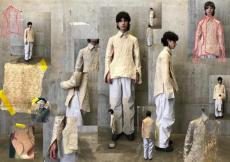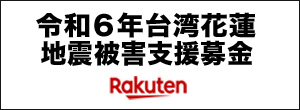「ジェンダーレスはファッションの流れは自分の好みと合致しています。過去のアイコンたちのスタイルを見ると、ファッションでその境界線を変えようとしているものが多く、私はそうしたものから確実に影響を受けています」I and Fashion Issue : Interview with Gavin Gega
NeoL / 2020年11月11日 17時0分
「ジェンダーレスはファッションの流れは自分の好みと合致しています。過去のアイコンたちのスタイルを見ると、ファッションでその境界線を変えようとしているものが多く、私はそうしたものから確実に影響を受けています」I and Fashion Issue : Interview with Gavin Gega
パンデミックで引き起こされた様々な変化を受けて、ファッションも転換期を迎えている。かねてより懸念されていた環境問題に関してのエシカルな動きは加速し、工業的な変化はもちろん、Black Lives Matterなどのムーヴメントからも文化の盗用やフィッシングをはじめとする問題にもさらに目が向けられるようになり、作り手のアイデンティティが強く問われる時代。そんな時代に、オリジナルを生み出すにはどのような思考、プロセスが必要なのか。アメリカ出身、4歳からファッションを愛し、テーラードのバックボーンを持ち、現在セントラル・セント・マーチンズでメンズウェアを学ぶGavin Gegaに話を聞いた。(→ in English)
ーーファッションへの情熱を生み出しているルーツは?
Gavin Gega「母によると私は4歳くらいからいつもファッションに興味を持っていたそうです。ブリーフケースを持ち歩き、スーツを着るのが大好き。13歳の時にテーラードに興味を持ち、16歳でアバンギャルドなデザイナーであるRick OwensやCraig Greenが好きな人たちと出会いました。それが私のスタイルの基礎を形成したものです。今はデザインにフォーカスしています」
ーー1日の始まりに服を選ぶときに、決め手となるのはどんなこと? 例えば天気、音楽、その日目に入った色など。
Gavin Gega「天候の影響はものすごく受けますね。ロンドンは雨が多く、雨の中で着られない服がたくさんあるので、いつも天気をチェックする必要があるのです。ものすごく大事だから、ぜったに雨の中では履かない靴とジャケットを持っています。雨が多いから似たような服でローテーションすることになってしまうんですよね。どんな色を着るかはそんなに意識していないかな」
ーー何年代のどのようなファッションが好きですか。また、好きな理由は?
Gavin Gega「歴史的に見て70年代はセクシーだと思います。自分のデザインに参照しているわけではないけれど、見ていて好きだなと。また、すべてをハンドメイドで行っていた1800年代は大好きです。ボタンホール、手縫い、形などが豊富にあるのでよく参考にしていて、そういうものをモダンにディレクションすることがとても面白い。参考にはしない年代もあって、例えば70年代をレファレンスにしてしまうとあまりにはっきりと分かりすぎてしまうでしょう? でも1800年代だと、そこから何か新しいものを引き出すことができるんです」
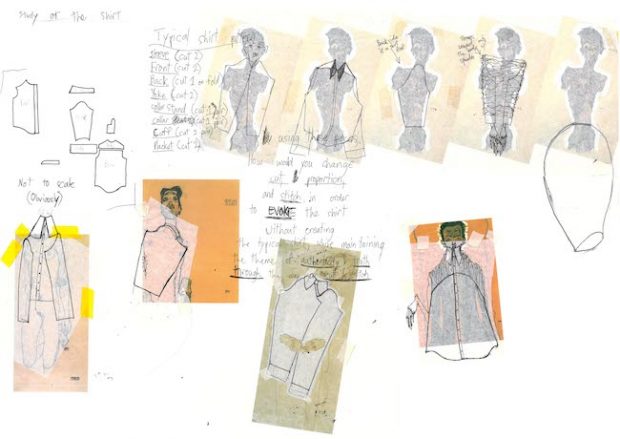
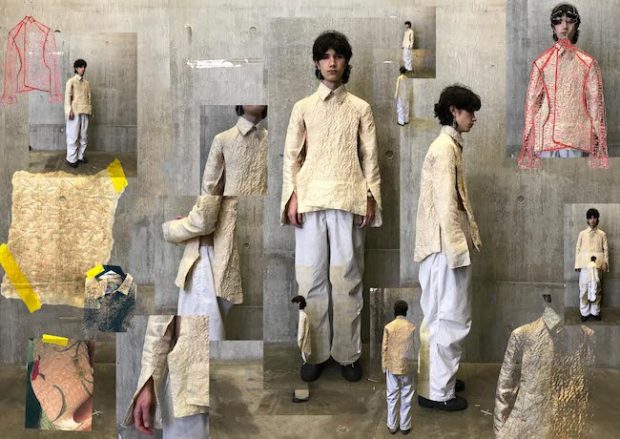
ーークリエイションに向かう際にインスピレーションとなるものは? 例えば幼少期の思い出、アート、SNSなど。
Gavin Gega「私は写真が大好きなので、すべてのプロジェクトでレファンレスとなる写真家や彫刻家を見つけています。それに加えて、時代の中で起こっている出来事に対しての人々の多くの感情、考えにも興味がある。通常は自分の周りで何が起こっているのかを考えるのですが、私は心理学が好きなのでそういうふうに人生について考えがちなんですよね。人々がどのように考え、行動するかについてとても興味があるんです。次に、レファレンスとなる写真を撮っているようなアーティストを探し、人々の感情や考えというものと組み合わせてみる。そうやって組み合わさったインスピレーションたちの中から、私独自のステッチ、カット、またはシェイプなどで何か新しいものが生まれるという感じです。
カオス理論を研究するプロジェクトも行ったことがあります。私は心理学者が、人生が混沌と秩序の間の絶え間ないバランスでできていると話しているのを聞いたことがあった。カオス状態にあるとき、私たちはチャンスがあり、その機会を利用して、そこから何かを生み出していくことができる。そしてそこから秩序と構造ができてくるとまた別のカオスに巻き込まれるので、私たちはいつもカオスと秩序を行ったり来たりしているわけですが、混沌としたものの中にも美しさを見つけることができるというのは重要。私はその理論をカオス力学と比較して考えていました。私はカオスのアイデアを取り入れ、数学記号やグラフと組み合わせ、それを使ってカオス的な方法で切り込みを入れてみました。何のプランもなくただ生地に切り込んで、そのカットアウトした布を持ってみたら、ジャケットの前面のように見えたんですね。だから心理学の理論と数学がレファレンスになっているこの方法で縫い合わせていき、ジャケットまたはペアのパンツのような作品になりました」
ーーファッションで自己表現をする際の自分の中の哲学があれば教えてください。
Gavin Gega「アメリカは歴史が浅いため、自分の文化をレファレンスしているものは避けるようにしています。韓国や日本の文化を参考にすることもありますが、黒を多用するようなデザイナーには夢中になってしまう。自分とは全く違うけれど、構造の部分に惹かれます」
ーーあなたはテーラードのバックグラウンドを持っていますが、メンズウェアを専攻したきっかけは?
Gavin Gega「服をデザインするときはいつでも、自分が着る服をデザインします。想像するときもいつも自分の着る服を想像する。だから自然にメンズウェアに入ったのです。学校でそのことを自問し、レディースもデザインしようとしたけどあまり得意ではなかったんですよね。でもメンズウェアをデザインすると、女性でも簡単に着ることができる。女性のためにデザインすると見た目が悪くなってしまうけど、私のメンズウェアは自分のことを想像しているからこそとても流動的で女性でも着やすくなっていると思います」
ーージェンダーレスなファッションが勢いを増していますが、メンズウェアに影響はありますか。
Gavin Gega「この流れは私の好みとぴったり合っています。誰が着るのかわからないクラシックなメンズウェアを作っているクラスメイトもいますが、私は男性用のヒールをデザインし始めているデザイナーが増えているのを見るのが喜びですね。ファッションの領域をより男性的な方法で捉えるという。ミック・ジャガーや名高いメンズウェアなど、過去のスタイルアイコンを見ると、男性と女性の境界線をファッションでねじ曲げようとしているものが多いんです。それらは私の制作に影響を与えています。とてもワクワクします。男女の区分けが意味を成すのは体型について話すときにのみ。だって明らかに私の体型は女性のものと同じではないのですから。しかし、スカートのようなタイプの衣服は、女性的な形から派生にもかかわらず、ある意味で男性的なものになるようにデザインすることができるんです」
ーーファッションはどのようなパワーがあると思ってますか。
Gavin Gega「よく自問するんですよ。多くの人が価値を見出してくれないのに、なぜこのようなことをしているのかを正当化したくて。今はパンデミックで、誰もが重要なことをしようとして重要ではないことに関心を持つのをやめている。しかし、このクレイジーな状況下でも、ファッション、アバンギャルド、そしてハイエンドは依然として繁栄していて、そのことがすでに意義を示していると思います。服は人々にパワーを与えると思います。自分自身を服で満足させられるし、その業界に入ってパワーを与える側になることもできる。少なくともそれが私が服を楽しむ理由です。
ユニークな服を見つけたときはそんなデザインを思いついた人に畏敬の念を抱きますし、それが自分のデザインにも刺激を与えていると思いますが、デザイナーになる前からも毎日新しいことに挑戦するような気持ちで生きていました。シャツをこう着たら、またはジャケットをああいうふうに着たらどうなるだろう。この新しいシェイプを手に入れて、それに合うようにワードローブ全体を変えよう。クローゼットの中に見栄えのする服は何もないけど、気に入ったドレスを買って、それに合う新しいものを見つけようとか。だから、ファッションの何が特別なのかを突き止めるのは難しい。
例えば自分にとって一番大切な服は、人生のある時期を思い出させてくれたり、大事なイベントに着たりしたもの。もう着ていないものもあるけど、とても意味があるので売れない。それはそこに思い出が詰まっているからなんですよね」
ーーファッションは外見の意識だけでなく、政治的スタンスを表す道具でもあります。Black Lives Matterなどの政治的ムーブメントはどのようにこれからのファッションを変えてゆくと思いますか。
Gavin Gega「アクティビズムは日々の生活の大きな割合を占めています。アートとアクティビズム、またはファッションとアクティビズムを分けて考えることはできないでしょう。したいかどうかにかかわらず、選んだモデルやレファレンスのようなものから、あなたがあなたの服で何をするかその視点を通して見られるから。ファッションではそれは比較的最近できた視点で、特に今はそれが高まっている時期。たとえば、アジア、黒人、白人のモデルを選んだ場合、服が似合うためにそのモデルを選んだかもしれないけど、他の誰もが『なぜこの肌の色や地域の人を選んだのか? すべてのタイプの人々を選んでいるか確認する必要がありますよ』という観点から見ている。
私はアメリカ出身なので、警察の残虐行為や多くの恐ろしい出来事を見てきました。それらはすべての人に起こりえるけれど、特に黒人コミュニティでは本当に大きな問題です。服を通してそれについて何か言いたいけど難しいですよね。ただ、あなたがそう感じていることを示すことはできる。私たちはアーティストであり、こうした気持ちを伝えようとしています。一方で正直にいうと、そうした主張をする服作りは自分には合わないと感じることもあって。美しい仕事をしながら主張をする人々もいて、そのようなことを自分もしようとしましたが、アクティヴィストではない自分がそうすることがただ不誠実に感じるんです。私は何かがおかしいと思ったら会話をするのが好きで、プロテストに向かうタイプではない。この6か月の間、私はそうした問題を自分が普段からやっているような制作に落とし込めるよう理解に努めてきました。しかし自分の作品は政治やアクティヴィズムとはほとんど関連していないため、これらの問題をデザインに入れることをやめて、いつも通りインスピレーションになるものにフォーカスするのが最善の方法だと思いました。私は外で話したいだけで、作品には用いません。そうした問題を作品内に取り入れることで成功している人をたくさん見てきましたし、さまざまな人々が自分たちなりの方法で創造の可能性を広げている様を見ることができるのはクールなこと。特に自分が知っている人たちが個人的な経験を用い、自分たちの服を通して表現するとき、それはリアルな表現なので本当に美しい。何かをするなら、その元となる経験、感情が正真正銘の本物でなければならない。そうでない場合は、本物の人々に表現を託した方がいいと自分は思っています」
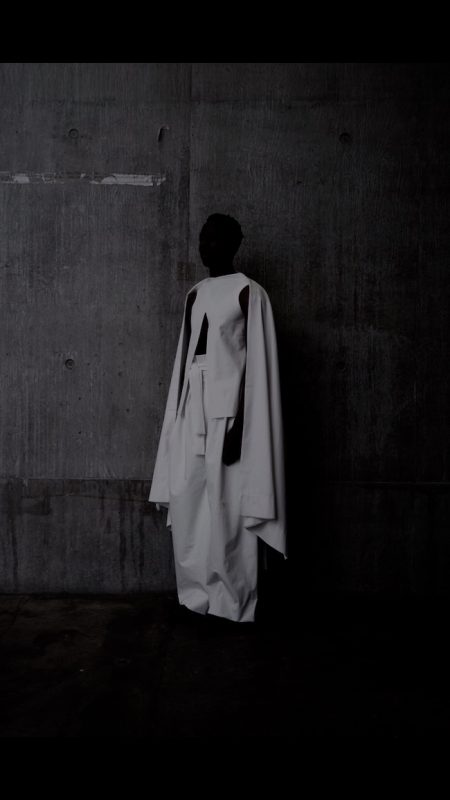
ーー自分の人種的なアイデンティティがどのようにファッションの世界で表現されてると感じますか。
Gavin Gega「私はそこに焦点を合わせていません。私たちは非常に過大評価されているから、そうする必要がないのかもしれない。私がデザイナーやモデルを見るとき、人種について考えたりしません。Hyeyeonと付き合っているので、中国人、韓国人、日本人のデザイナーが登場するのは楽しみです。黒人デザイナーは90年代から登場していますし、少なくともアメリカではストリートウェアから多くのものが生まれてきている。現在ファッションでは、中国、韓国、日本から多くのデザイナーが登場していて、それらの作品はセルフリッジとドーバー・ストリートで見ることができます。ファッションのニューウェーヴが生まれ、表現が変化するのを見て興奮しているところです」
ーーパンデミックによって、ファッションのプレゼンテーションも変わってきています。自分のファッション、またクリエイションそれぞれに変化はありますか。
Gavin Gega「やりたいことがあったのですが、時間がかかるので断念したりはありました。パンデミックでは授業がなく、友達と会うことができなかったので、家にこもっていつも縫い仕事ことができましたね。手縫いのプロジェクトをたくさんやって、新しい縫製技術を学びました。尊敬するデザイナーとその技術について調べたり。また、自分の知識ではどうやってプロジェクト全体を形づくるのかわからなようなことに対する新しいアイデアを模索していました。たとえば『ミシンや針と糸を使わずに、どうやって縫うのか』というようなこと。そこで、どのような素材や工法を使うのかを考え、いくつかのアイデアを実践してみました。素晴らしい衣服、美しいプロジェクトにはなりませんでしたが、追求する方法についての理解を深めることができました。後により良くなるような手法を取り入れていくことができると思います」
ーー自粛などでクリエイティブになりづらいと感じてる人もいます。あなたはどのようにインスピレーションを探し続けていますか。
Gavin Gega「今はずっと難しい状況ですよね。以前は、信じられないほどのリソースである学校の図書館にて知識を得ることができました。Googleで検索する現代ではトリッキーに思えるかもしれないけど、Googleは芸術を育てるのに向いてないと思います。 『岩についてのアート写真』を検索したい場合、おそらくストックされた奇妙な地質学的風景のストック写真が出てくるはず。でも学校の図書館に行って『岩』を探すと、さまざまな方法で岩に魅了されてきた人々を見つけることができます。ですから、開店が許されているお店をまわり、ギャラリーにも頻繁に訪れたりというできるだけのことをしようとしています。許可が必要なため事前にすべてを計画しなくてはならず、最大4日間をかけて何をしたいか、すべきかを理解するというようなスケジュール間で動いている状況。計画していても、その場所が閉鎖されたか、もう開いていない可能性もある。自分が到達したいポイントに行くために少し時間がかかるため、いくつかの過去には体験していない奇妙なプロセスの上で必要なインスピレーションを得ることができると言った具合です」
ーーオンラインでたくさんの情報に触れてしまう中でオリジナルをどのように作っていますか。
Gavin Gega「作品を作るとき、ソーシャルメディアのことは考えていません。好きという気持ちか、または面白くて新しいかということについてだけ考えています。ポストする時がきたら、最大限に興味を持ってもらうための方法は考えますがね。SNSにそれほどの労力をかけているわけではないけれど、世に出すのであればみんなに見てもらいたいし、関わってもらいたいですから。単にスクロールして通り過ぎるのではなく、フィードで目立つものにしたい。人々は1日に何千もの画像を見ているので、一瞬でもそこに止まってもらいページをクリックするような画像にするのは難しいけど、トライしたいとは思います。他の画像にも興味を持たせたりということを、1つのポストでやろうとしているわけです。
オリジナルにしようとするとき、自分のアイデアはおそらく以前にもあったのだということを受け入れる必要があると思います。しかし、あなたが自分のリサーチとプレゼンテーションに真摯に、オーセンティックに向き合っているのであれば、他の人が作ったものとは違うものを作れるでしょう。また、自分自身を非常に批判的な目線で見ることも必要。自分の作品を他の人でも作れたり、あまりにも似ていると思うなら、ちゃんと変える方法を見つけないと。
また、理解したポイントを超えてさらに高めていく必要があるでしょう。プロジェクトのたびに自分のテキスタイルや衣服を見て、どんどん好きになるように感じませんか。写真に撮って保存するけど、それからさらに一歩進んでいって、新しいステッチを追加し、浸したり、完成したと思うものを一歩超えてください。そしてその時点で、それが新しいものになり、完成したと思っていたものから一歩進んだので、以前のものとは似ていないことに気づくはず。そこに新しいものが見つかると思います。それが自分のプロジェクトが最高だと私がいつも思うところですね」
ーーパンデミックや環境保護のための取り組みでファッションの方向性は変わりつつあります。そのことについての意見を聞かせてください。
Gavin Gega「私はファストファッションが嫌いです。パンデミックや環境保護でファストファッションに関する物事が変わるといいなと思っているのですが、今のところ変わっていないかな。みんなが気候変動のためにヴィンテージを買うことや、服の購入を減らすことについて話題にすることが増えているように感じます。気候問題について知る前から、私は常に、人々がより少ない服を買うことに集中するようになった理由が何であれ、買う服を気にかけ、アーティストをサポートするほど、より幸せになるという哲学を信じています。パンデミックと気候変動に伴い、より多くの人々がより本質的なものにシフトしています。芸術作品のように不必要なものでさえ、いかに重要であるかという理解が進んでいます。私自身、新しい花瓶を8つ購入しました。
自分にとってより重要な服を買うようになれば、実際に服は不可欠なものになるんです。みんながくだらない支出よりもエッセンシャルなもの、特にファッションに焦点を当て始めているのは良いことだと思います」
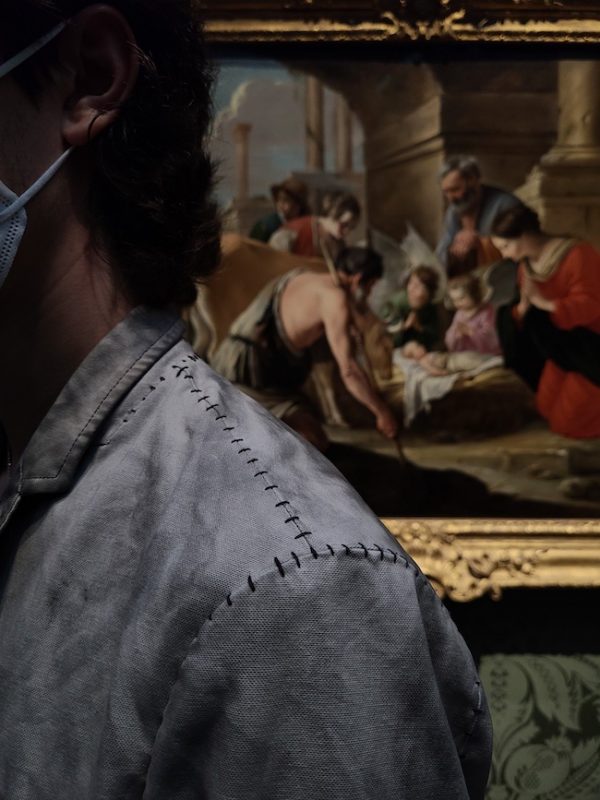
ーーファッション学生が無償のインターンシップをすることは通例となっていますが、それについてはどう思いますか?
Gavin Gega「無料でもやるほどの関心ごとではあるのですが、本当に良くないですよね。ただ世に出たり、得ることができる機会が欲しいのですが、無料でのインターンができるほど余裕があるということがとても幸運であることも理解しています。大学生であるため両親がサポートしてくれていて、インターンシップをとらなければいけない年に、そのインターンシップが一年間無償である場合は、学生ローンを使い、両親の助けを借りて生活するわけです。非常に重要となるかもしれないインターンシップを放棄しなければならない人々のことも知っています。彼らはいくらかの給料を得るか、家賃補助のためバーバリーかバレンシアガに行くことになる。ひどいけど、需要と供給のようなものだとも思います。仕事の供給は非常に少なく、こうしたファッションカンパニーで働きたいと思う人々の需要は非常に多い。ですから、彼らはあなたにお金を払う必要がなくなる。変わってほしいけど、ファッションを始めようとする人が多く、チャンスが少ないことを鑑みると、変化するとは思えない。それがファッションのエコシステムである限り、無料で働くことをいとわない人々がいるでしょう。インターンに支払うことを強制するならば、企業はより支払いが少なくて済むインターンを雇う、そしてあなたはよりチャンスが少なくなる。企業も生き残ろうと必死であり、また支払いをしないような企業は小規模で余裕がないという側面もある。毎シーズン、彼らはコレクションにすべてのお金を注ぎ、次のコレクションにもっとお金を注ぎ込めるようにします。ファッション分野のそうした側面は非常にトリッキーであり、今後どうすれば正しい方向に進めるのかということを一概に言えないということもあります」
ーーこのファッション転換期でファッション学生として、これからやるべきことは何だと思いますか。
Gavin Gega「私はテキスタイルが苦手なので、今はテキスタイルのことをもっぱら勉強しています。生地が大好きで、何かに取り組むときはわかりきってるような手順を踏まないようにしているんです。たとえば、ガラスや陶器を参考にして、そうした素材感を衣服に用いることもできると個人的には思うんですよ。普通の布を、ガラスや陶器のような感じにするにはどうすればよいか。そういう感じで、テキスタイルで何ができるかに取り組んでいます。どう縫うか、これを上に加えるか、何と結み合わせるか、ペイントするか、浸せるか。そのようなことが最も革新的だと思います。ほとんどの人はどれか一つ、またはどちらか一方だけのことを考えていて、布についてか、陶器かグラス、衣服としてのガラスに焦点を当てています。この2つを融合させると、布を陶器に変えたり、陶器を布に変えたりするような、非常にユニークなものを見つけることができる。彫刻や通常の衣服ではない服が作れるんです」
ーーファッションはヴィジュアルが重視され、一目でジャッジされることが多いですよね。あなたの作品は非常にコンセプチャルですが、どのようにオーディエンスに見せたいと思います?
Gavin Gega「Rick Owensを尊敬しているのは非常にコンセプチュアルであるからですが、彼は自分自身をマーケットにどう見せるか、そしてコマーシャルであるやり方も知っています。彼は双方から注目を集めているんです。彼は大胆なことをして、ヴィジュアルに夢中になっている人々を惹きつけ、同時にコレクションの背後にも意味を持たせている。インタビューを聞いたり、コレクションを深く調べたりすると、コンセプチュアルな裏付けを見つけることができます。そうやってコンセプチャルな作品を愛する人々とコマーシャルな仕事を愛する人々双方との強いコミュニティを持つことができている。どちらの人々も購入するからブランドを成功させることができているのです。コム デ ギャルソンの川久保玲と同じですね。彼女は非常に強力なコマーシャルワークをでき、コンセプチュアルな作品に資金を回すことができている。
Carol Christian Poellにも感服します。彼は多くのバックグラウンドのリサーチを行っていますが、コマーシャルには関心がありません。彼は仕事を喜んでやっていますし、レーベルはその意味で非常に成功しています。しかしコマーシャルな側面を無視しているため、主要なブランドとして認識されていません。
私はコレクションを作るというアイデアが好きです。みんなにシェアされるための「Wow!」というような作品も入れますが、ほとんどの作品は自分自身を驚かせるようなもの。もちろん「Wow!」というピースも本物でなければなりません。物事のコマーシャルな側面も愛さないと。全部に心を込めないともったいない。自分に正直であるならば、あなたを見つけ出す人々が出てきて、あなたのためのコミュニティができるはず。無理にやらねばと心配する必要はないと思います」
ーーファッションでの表現にしても、自分の殻を破るということにしても、アクションを起こしたい、一歩踏み出したい人のために何かアドバイスは?
Gavin Gega「行動あるのみ。私は14歳のときに始めました。着たいものをすべて身に着けていたのですが、それほどクレイジーな格好はなかったかな。当時はスーツが大好きだったので、毎日学校でスーツを着ていました。私はちょっと変わった子だったし、みんなからもとそう思われていたと思います。でも自分が着たいものだとわかっていたので続けたし、友達もそれを受け入れてくれていました。
ずっとそれを続けてきただけ。あなたが何か新しいことを試みたいなら、最初の数回はよくわからなくてできないいということも受け入れないといけない。間違ったチョイスをして、ひどい格好になることもあるはず。私は2年はひどい格好をしたと確信しています。 15から17歳の間は自分が何が好きかわからなかったので、それはひどいものでした。毎日、どこにも行きかない日でもそういう間違いを犯しながらスタイルを作ったことで自分に自信ができました。
以前自宅学習をしていたので、週5日ひどい服を着ることができて、両親は戸惑っていたけど、その5日間でうまくいった服を1つ見つけ、日曜日に教会に行くときはその服を着るということをしていたんです。それが自分を開発する方法です。今外に出るときは、この自信を持っています。自信があるから勝てるんです」
text Maya Lee
Gavin Gega
second year student at Central Saint Martins, studying Menswear.
https://www.instagram.com/gavin.gega/
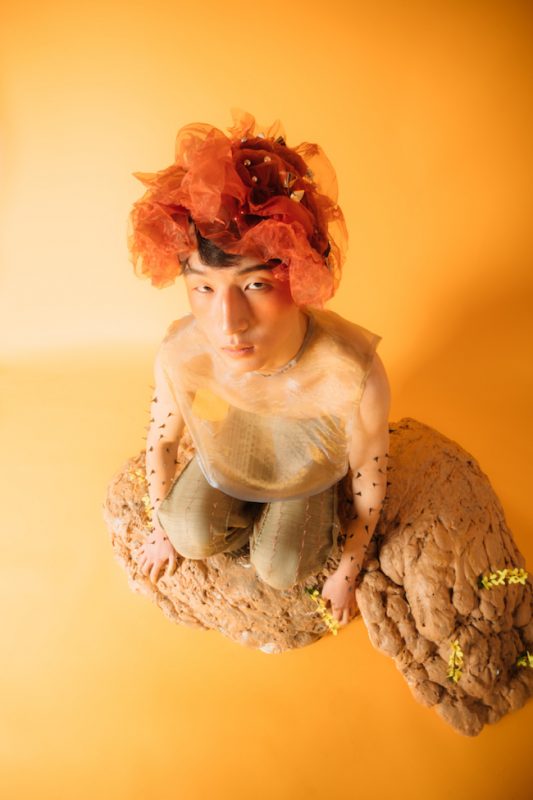
-What are the roots of your passion?
Gavin Gega : My mom says I was always interested in fashion. Since like four. I use to carry around a briefcase, and I love dressing around in suits. I think I got interested in it when I was thirteen. I was interested in tailoring. When I was sixteen I met people who like Rick Owens and Craig Green, avant-Garde designers. That’s what formed my foundation of style, design focus now.
-What does your outfit every day depend on? Is it affected by the weather, colours that catch your eye?
Gavin Gega :It’s affected by the weather. It rains a lot here so I always have to check the weather because I have so many things I can’t wear in the rain. They are too precious to me. I have shoes and jackets that I won’t wear in the rain. I end up having to rotate between similar outfits because it's always raining so much. I’m not too concerned about wearing colour.
-What period fashion do you like and why do you like it.
Gavin Gega :Historically, 70s is sexy. Although I don’t reference it from my designs, I like to see it out and about. Also, I love how in the 1800s everything with done by hand. So I like to reference that period a lot because there is loads of buttonholes, hand sewing and shaping. It's very interesting to reference those to pushing things in a modern direction. It’s easier to avoid the period while referencing it, it becomes more obvious if you reference the 70s. If you reference it in the 1800s, you can pull something new out of it.


-What is your main source of inspiration? (Art, social media, childhood memories)
Gavin Gega :I love photography. So in every single project, I always find some photographer or sculptor to reference to. Besides that, I include a lot of emotion, thoughts about whats going on in times. Usually, I think about what’s going around me. For instance, I have this thought about life, because I enjoy psychology. So I have this idea about how people think and behave. Then I go on to looking for artists, that have some photos that I can reference, and I marry those two things together. Out of that give birth to something new. With the way I do my stitching, cutting or the way the shapes are.
I did a project where I was researching about chaos theory. I was listening to this psychologist talking about life being the constant balance between chaos and order. When in chaos, we have the opportunity and we take the opportunity and we birth order out of it. After having some semblance of order and structure in life, we get shot into another bout of chaos. So it's like always going back and forth but finding this beauty in whats chaotic. I was comparing that theory to the mathematical term of chaos. I took the idea of chaos, and combined it with the mathematical symbols and graphs of Chaos, and used that to cut into chaotic ways. Where I wasn’t planning anything and just cutting into fabric. Once I had that cutout, I noticed it looked like the front of a jacket. So I was structuring that together and stitching it in these ways that resemble the graphs. It came about to a jacket or a pair of trousers. The way that they were shaped, sewn together was referenced by the psychological theory, as well as the mathematics.
-When you express yourself in fashion, do you have your philosophy?
(For example, incorporate something from your race, wear something sustainable, of express your emotional status)
Gavin Gega :I try to avoid everything that’s culturally referencing my own culture. I think that’s because Americana is not very old. Sometimes I reference a bit of Korean, Japanese cultures but usually I’m really into dark designers that do all black. I don’t feel like it represents my emotions at all. I like the structure.
-You have a background in tailoring. What made you choose to study menswear?
Gavin Gega :I didn’t even really think about it. Whenever I design clothes I would design clothes that I would wear. When I imagined it, I would imagine it on me. So I naturally went into menswear. Then I asked myself that question when I was in school. I tried to design womenswear, but I wasn’t very good at it. When I design menswear it can be worn by women easily. My menswear is very fluid. But when I design for women. It just looks bad. Because I always imagine myself in clothes.
-More genderless fashion is coming about. Have you seen this effect in menswear?
Gavin Gega :Definitely in my taste. I have seen other classmates still focused on classic menswear although they wouldn’t care who wore it. For me, I love seeing how many designers are starting to design heels for men. I think that a realm of fashion that can be taken in a more masculine way. When we look at some of our style icons from the past like Mick Jagger, notorious menswear figures, they all tried to bend the lines between masculine and feminine in fashion. So I see that influenced my work. It makes me very excited to see. Because of this division, we have only made sense when we talk about body types. Like obviously my body type is not the same as a women's. But we can design these type of garments like skirts to be masculine, in a way even though they come from a feminine shape.
-What power do you think fashion has?
Gavin Gega :I always ask myself this question because I feel like you have to justify why you do this thing that a lot of people don’t see the value in. We are in a pandemic and everybody is trying to do important things, you stop focusing on things that aren’t important. But fashion, avant-garde, and high end are still thriving even amid this craziness. I think that kind of shows something about the significance of it. I think clothing empowers people, you feel good about yourself. You can appreciate the effort that goes into it. At least that’s why I enjoy clothing.
When I find something that’s unique, I feel such awe towards the person who came up with it. And I feel it inspires me in designing, but even before I was a designer, I feel like it inspires me to try new things daily. What if I take my shirt and wear it this way, or what if I have a jacket and wear it this way. Or get this new type of shape and I have to change my whole wardrobe to fit that in. I think sometimes you see things that are so inspiring that even though you have nothing that it will look good within your closet, you buy it and you have to find new things to fit with it because you love that one piece so much. So it's hard to put a finger on what it is that is special about fashion.
When I think about the pieces that matter to me the most, it reminds me of a period in my life or I wore them to a specific event. Some of the things that I don’t wear anymore, I can’t sell them because they mean so much to me. The memories that are held within them.
-Fashion is not just about appearance; it is also a tool for political statements. How do you think the Black Lives Matter movement will change fashion?
Gavin Gega :I think activism is so much a part of everybody’s life daily. It's hard to separate art and activism, or fashion and activism. Whether or not you even want to, what you do with your clothing, like the models you choose or the references you have will be viewed through that perspective. I think that’s relatively new in fashion. Especially now it's heightened. For example, if you choose a model who is Asian, or Black, or White, you might have made that choice because the clothes look good on them. But everybody else is viewing it from the perspective of “Why did you choose that person of this skin colour or region? You have to make sure you choose all these types of people.” There is more benefit to it. Being from America, I have seen a lot of police brutality and horrible things that happened, and they happen to everybody, but especially in the Black community, it’s a real big issue. It's hard because you want to say something about that through your clothing. Or show what you do because you feel it. We are artists and we try to communicate these feelings. On the other hand, sometimes I feel like clothing isn’t the place for it for me. I’ve seen people that take it and so a really beautiful job with it. I tried to do something like that and it was just disingenuous because I’m not an activist. When I see something that’s wrong I like to engage in conversation. I am never one to go to protest. I found myself getting caught in that for the past six months, trying to figure out how can I talk about these things that are clearly an issue and still be true to the way I usually create. Which almost have nothing to do with politics and activism. So I think I just found that for me, it's best to leave it out of my design and focus on things that I use for my inspiration typically. I just want to talk about it outside. But I’ve seen how there is a lot of people successful with incorporating that in their work. I think its cool to see how different people can be creative in different ways. Especially when people that I know use that personal experience and express that through their clothing. I think that’s when it's really beautiful because it's so genuine. So I feel that if you are going to do something about that it has to be genuine. And if it's not genuine, its best to leave it alone and let somebody else focus on it.

-How do you feel your ‘race’ is represented in the fashion world?
Gavin Gega :I don’t focus on it. The reason why I don’t focus on it is that I don’t have to? We are extremely overrepresented.
For me when I see a designer or a model, I don’t usually think about their race.
Now that I am dating Hyeyeon, I am excited to see Chinese, Korean and Japanese designers coming forward. Black designers have been coming up in the industry for a while since the 90s. I think that it's coming a lot from streetwear, at least in America. Now in Fashion, we see the emergence of so many designers coming from China, Korea and Japan. We are seeing their work in Selfridges and Dover street. It's the new wave of fashion. I’m excited to see the representation shift.
-Due to the pandemic, the way fashion is presented is very different. What are ways you continue to make original work?
Gavin Gega : I had these things that I wanted to do but couldn’t spend the time on them because they require lots of time. In the pandemic we didn’t have classes, we couldn’t meet with friends, so I could just sit home and sew all the time. I did loads of hand sewing projects and learning new sewing techniques. I researched about designers that I admire and their techniques. I was also trying to explore a new idea that I didn’t know how to do a whole project on it. Something I wanted to sample.
For example, “how do you sew something without using a sewing machine or needle and thread”, because I had no access to those things? So I looked at what type of materials and construction methods to use. I worked with a couple of ideas with that. It didn’t become an amazing garment that I love or a beautiful project but now I have an understanding of how to pursue that. Which I can put into a more legitimate project later.
-With quarantine and staying at home, many find it harder to be creative. What are ways you get inspiration?
Gavin Gega : It's more difficult now. We used to have access to the school library which was an unbelievable resource. Now it's tricky because you have to google things but Google is so bad at bringing up art. If I wanted to google “art photography about rocks” you will probably get stock photos of weird geological landscapes. Whereas if I go into the school library and look for “rocks”, I will find all these people who have been fascinated by rocks in different ways. So we do as much as we can. I go to as many shops that are allowed to be open and I go there for as long as I am allowed to be there. We’re trying to schedule visits to galleries. You have to plan everything in advance. You have to give yourself up to four days to figure out what you have to do. Whatever you plan, it might be that the place got shut down or they aren’t open anymore. It just takes a little bit longer to get to the point you want to be. You can get the inspiration you need but you just have to go through weird channels.
-In a time where you have access to millions of works online, how do you maintain original work? Are you affected by likes and followers on social media?
Gavin Gega : When making my work, I don’t think about how it will be reflected in social media. I just think about whether I like it, or if it's interesting and new. When it comes time to post it, I want to find a way to show this most interesting so that I get the most engagement on it. It’s not even I put a lot of effort into this work, and when I put it out I want people to see it and engage with it. I don’t want them to just scroll past it, I want that to be something that stands out on the feed. That’s what's difficult because you’re going up against thousands of images a day that people look at, and you are trying to make yours the one that stops somebody for a second and maybe click on your page. Maybe they will look at your other images, and you try to figure out how to do that with one post about a garment.
In trying to make it original, you have to accept that you’re ideas have probably been done before. But as long as you are being genuine and authentic with your research and your presentation, you will always wind up making something different than what other people have made because it comes directly from you. As long as you are letting it be genuine and authentic, I think it will be different. You also have to be very critical yourself. If you look at it and you think it looks too similar if you think that other people will think that. So you have to find a way to make it different.
you just have to be genuine about it. You also have to push yourself beyond the point you think you have it figured it out. Every time in a project I feel you get to a point where you look at the textile or garment and you like it. You take pictures of that and keep it, but then you take it one step further. Adding a new stitch, dip it, taking it one step beyond what you think is finished. Then at that point, you realise it becomes a new thing and its not similar to what has been done before because you took one step further from what you think was the end. I think that’s where you find something that’s new. That’s where I usually find my project are the best.
-Pandemic and climate change has shaped fashion in a certain way. What is your opinion on this?
Gavin Gega : I hate fast fashion. I hope things change with fast fashion but it seems like they’re not changing. I feel like more people are talking about shopping vintage, and talking about buying less clothing because of climate change. I’ve always believed in that philosophy, even before I knew about climate issues. Whatever reason that caused people to focus on buying less clothing, caring about the clothing you buy, supporting artists, the more we shift towards that the happier I am. With the pandemic and climate change, more people are shifting towards what is more essential. Even things that are unnecessary, like pieces of art, you realise how essential these things are. We just bought eight new vases.
When people are focusing on buying clothing that is more significant to them it actually will be an essential piece. I think it's good how we are starting to focus more on essentials rather than frivolous spending, especially on fashion.

-Currently, fashion is experiencing a big transition. As a fashion student in this era, what are your next steps?
Gavin Gega : I’m focused on textiles right now because I have always been bad with textiles. I love fabric and when I work on something I try to not take the obvious steps. For instance, if I’m using glass or pottery as a reference, I feel like personally, it’s obvious to make a garment out of that material. How can I manipulate normal fabric to behave as though its glass or pottery? In that sense, I focus on what I can do with textiles. Can I sew it like this, or add this medium over the top, or can I bond it with this, can I paint it with this, or dip it in this. Those sort of things is the most innovative right now. Most people do one or the other. They either focus on fabric as fabric or pottery or glass as garments. If you marry those two, that’s where you find something very unique where it's like turning fabric into pottery and turning pottery into the fabric. You create a garment that isn’t a sculpture or a normal piece of clothing.
-Fashion is very visual. A lot of work is judged by first glance. Your work tends to be very conceptual. How do you want your audience to see your work?
Gavin Gega : What I admire about Rick Owens is that he can be very conceptual but he also knows how to market himself and how to be commercial as well. He garners the attention of both people. He will do something bold so that people who are into visuals, can like and engage with it. At the same time, he also has meaning behind the collection. When you listen to the interview or explore the collections deeper on your own, you can see the conceptual backing of it. Therefore he has a strong community of people who love his conceptual work and a strong community of people who love his commercial work. He sells to both of those people and that’s why his brand is so successful. Same with Rei Kawakubo with Comme des garcons. She has very strong commercial work that allows her to fund the conceptual work.
I admire Carol Christian Poell. He does a lot of background research but he doesn’t care about being commercial. He’s happy doing that, his label is very successful in that sense. But he doesn’t have a major brand name awareness because he neglects the commercial side of things. For me I like the idea of making a collection, you put in a few pieces that will be your ‘wow’ pieces that will get you shared, but most of your collection is about things that amaze you. Of course, your ‘wow’ pieces must be genuine as well. You have to love the commercial side of things as well. If you don’t put your heart into all of it, I think it’s a waste. Your community will come, if you are being honest, there will be people who will find you. I think you don’t have to worry about forcing it.
-What is your advice to someone who is trying to step out of their comfort zone in fashion, to test their limits and take action?
Gavin Gega : Just do it.
I started when I was fourteen, just wearing everything I wanted and it wasn’t even that crazy. I loved suits at that time, so I wore suits every day to school. I was weird, everybody thought I was super weird. I knew that’s what I wanted to wear, so I kept doing it and I still had friends, and people let me be.
I just kept doing that over time, and you have to accept that if you want to try something new, you are going to look bad when you wear it for the first few times because you won’t wear it right. Of course you will do something wrong and struggle through the time where you dress like garbage. I’m sure I dressed like trash for two straight years. Between fifteen to seventeen, everything I worse was terrible because I was I didn’t know what I liked. I was making terrible outfits, but by making those mistakes, every single day even when I wasn’t going anywhere. That gave me confidence.
I used to be homeschooled so I could wear terrible outfits five days a week and my parents were confused. I would find one outfit that worked in those five days, and on Sundays when I go to church I would wear that outfit. That’s how you develop it and now when I walk outside I just have this confidence. That’s when you win, when you have confidence.
text Maya Lee
Gavin Gega
second year student at Central Saint Martins, studying Menswear.
https://www.instagram.com/gavin.gega/
関連記事のまとめはこちら
https://www.neol.jp/fashion/
外部リンク
- ピンクはいったい誰のもの? 身につける人の性別を問わないアンダーウェア 「REING Underwear」に新色・ピンク登場。 ジェンダーバイアスを超えて、人間の多面性を祝福する”ピンク”をコミュニティと共創
- 「ジェンダーレスはファッションの流れは自分の好みと合致しています。過去のアイコンたちのスタイルを見ると、ファッションでその境界線を変えようとしているものが多く、私はそうしたものから確実に影響を受けています」I and Fashion Issue : Interview with Gavin Gega
- 「新しいことを試す恐怖と“白人のようなことをしているのではないか”ということで、自分のアイデンティティを拒絶し、ゴスへの関心を恥じていました。けれど、それが自分のルーツと調和できる豊かなコミュニティであり、生き方だと気づき解放されました」I & Fashion Issue : Interview with Krissie
- I & Fashion Issue : イェッぺ・ウゲルヴィグ『Fashion Work 1993 – 2018: 25 Years of Art in Fashion』インタビュー/Interview with Jeppe Ugelvig
- 真の美しさは、身体や外見ではなく、自身の内なる場所に宿る。 ビヨンセとのコラボレート、待望のセカンドコレクション「adidas x IVY PARK」
この記事に関連するニュース
-
面接対策から日常会話まで、「日本語のオンラインプライベートレッスン」5月生・6月生の募集を開始!
PR TIMES / 2024年4月17日 9時45分
-
生産間接材購買プロセスDX革新「D-JIT(ディージット)」 をサービスイン<English Follows>
PR TIMES / 2024年4月15日 13時15分
-
Hyperithm、世界初のデジタル資産向けのヘッジプロトコルを開発する「Umoja」に出資
PR TIMES / 2024年4月12日 17時15分
-
日本ゼオン、偽造防止にもなる新素材を取り入れたアート作品を世界初披露
PR TIMES / 2024年4月4日 9時45分
-
芸能事業「UQプロダクション」を開始し、社長自らアーティストデビュー
PR TIMES / 2024年4月2日 12時15分
ランキング
-
1外国人がよく行く「ファミリーレストラン」ランキング! 「ガスト」を抑えた1位は?
オールアバウト / 2024年4月24日 21時5分
-
2【急なお通夜に参列】喪服がない…どうする? ユニクロやGUで見つける「喪服の代用」アイテム
オールアバウト / 2024年4月24日 20時15分
-
3究極の卵料理「ウフマヨ」が簡単に作れちゃう! 農水省がレシピを伝授
オトナンサー / 2024年4月24日 22時10分
-
4老後破綻を招く?親世代とのお金観の違い4つ
オールアバウト / 2024年4月24日 21時40分
-
5右肩上がりの「完全栄養食」味は微妙…と思いきや。日清“完全メシ”を食べ比べて「今後が楽しみになった」理由
女子SPA! / 2024年4月24日 15時46分
記事ミッション中・・・
記事にリアクションする
![]()
記事ミッション中・・・
記事にリアクションする

エラーが発生しました
ページを再読み込みして
ください



